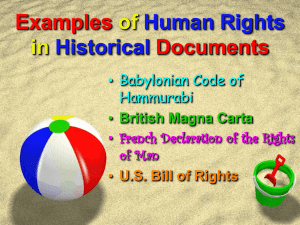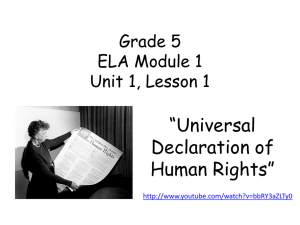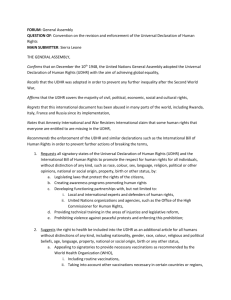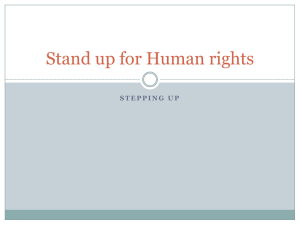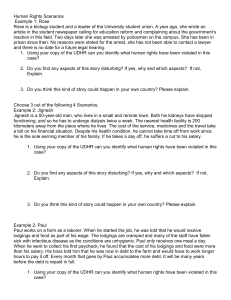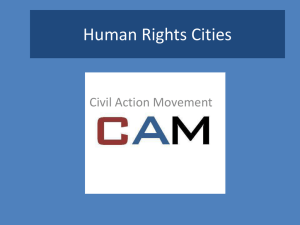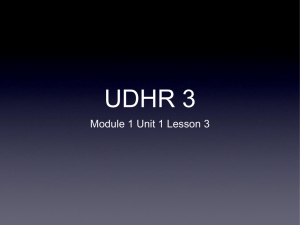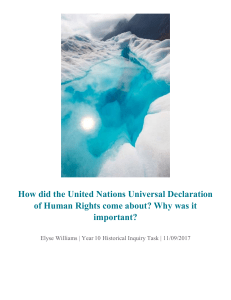here - American University Washington College of Law
advertisement
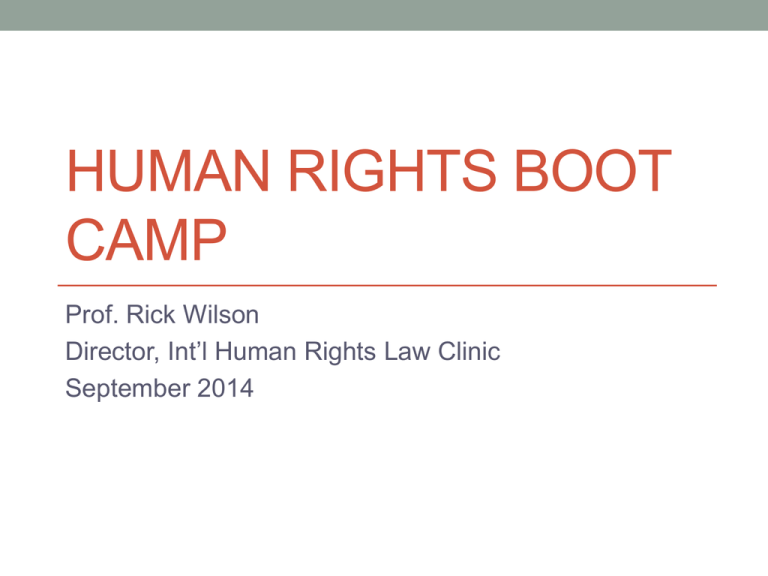
HUMAN RIGHTS BOOT CAMP Prof. Rick Wilson Director, Int’l Human Rights Law Clinic September 2014 What are “human rights”? • The narrow, legalistic (law school) definition – the fundamental, universal individual [and collective?] rights that are articulated in ratified global and regional treaties, and the customary law of nations, both of which create international legal obligations (yes, but what about domestic, U.S. obligations?) • The doctrinal fields covered – international human rights law; international criminal law; international humanitarian law; ICRC? UNHCR? ILO? UNESCO? WHO? FAO? (is anything NOT human rights law!) • The broad, Wilsonian definition – what we call “public interest law”: legal work that protects and defends vulnerable and/or underrepresented persons or populations (The lowest paid job you’ll ever love!) CP Rights in the UDHR (1948) • Art. 1 – equality and dignity • Art. 2 – non-discrimination • Art. 3 – life, liberty and security of person • Art. 4 – no slavery or servitude • Art. 5 – no torture or CIDT or punishment • Art. 6 – personhood • Art. 7 – equal protection • Art. 8 – effective remedy in competent court • Art. 9 – no arbitrary arrest, detention or exile • Art. 10 – fair and public hearing in independent and impartial tribunal • Art. 11 – fair trial rights in crim pro – presumed innocent, “defence”, public trial, no ex post facto conviction, no heavier penalty later CP Rights in the UDHR (cont’d) • Art. 12 – no arbitrary interference with privacy, family, • • • • • • • • • home or correspondence, honor, reputation Art. 13 – movement and residence within borders Art. 14 – asylum Art. 15 – nationality Art. 16 – marriage and founding a family [Art. 17 – own property; no arbitrary deprivation of property] Art. 18 – thought, conscience and religion Art. 19 – opinion and expression Art. 20 – association and assembly Art. 21 – political participation and public services ESC Rights in the UDHR • Art. 22 – “social security” (broadly, not U.S.) • Art. 23 – work and equal pay; unions • Art. 24 – rest and leisure • Art. 25 – adequate standard of living – food, clothing, housing, medical care, worker’s comp; special care for mothers and kids • Art. 26 – education • Art. 27 – cultural life; intellectual property protection Collective right and duties in UDHR • Art. 28 – entitlement to fully realized rights in the social and international order • Art. 29 – duty to community; limitations only on “just requirements of morality, public order and the general welfare” Big debates in human rights • Are they “Western” or culturally specific? • Are they hierarchical or “generational”? • Are there negative/positive human rights? • Are they enforceable law or only aspirational morals – hard or soft law? • Are they recent (70s) or timeless? • Do they show up ANYWHERE in your first year required courses? What to pay attention to in ALL classes • When is the course about substance v. process – lawyers OBSESS about process!! • Who is taking a case to court? Who are they suing and why? • What’s the story behind the reported case? What’s the subtext of “thinking like a lawyer”? (What about acting like a lawyer?) For back stories, see “Human Rights Advocacy Stories”! • Learn how NOT to follow the herd – firms, law review, clerkship A Human Rights Activist Reading List (because you don’t have enough now!) • Read any or all of these to restore your heart and soul: • William Quigley, “Letter to a Law Student Interested in • • • • • Social Justice” Duncan Kennedy, “Legal Education and the Reproduction of Hierarchy” (or “As Training for Hierarchy”) Peter Cicchino, “Defending Humanity,” or anything else by him: http://petercicchino.com/writings.html Jules Lobel, “Losers, Fools & Prophets: Justice as Struggle” Gerald López, Rebellious Lawyering Any edition of The Politics of Law: A Progressive Critique Words to Live By • We can take inspiration from social justice lawyers like Mohandas Gandhi, Nelson Mandela, Shirin Ebadi, Mary Robinson, Charles Hamilton Houston, Carol Weiss King, Constance Baker Motley, Thurgood Marshall, Arthur Kinoy and Clarence Darrow. Bill Quigley • The better the society, the less law there will be. In Heaven, there will be no law, and the lion will lie down with the lamb. In Hell, there will be nothing but law, and due process will be meticulously observed. Grant Gilmore • A lawyer is either a social engineer or he’s a parasite on society. Charles Hamilton Huston
